Common Louvre Window Problems Overview
Louvre windows are popular in Sydney homes for good reason—they provide excellent ventilation and light control. However, their moving parts and multiple glass blades make them susceptible to specific issues. Let’s explore the most common louvre window problems and determine which ones you can tackle yourself.
| Problem Type | Common Causes | DIY Difficulty | Professional Recommended? |
| Leaking Windows | Worn seals, misalignment, frame damage | Moderate | Often |
| Stiff Mechanisms | Corrosion, dirt buildup, paint obstruction | Easy to Moderate | Sometimes |
| Broken/Cracked Blades | Impact damage, pressure, age | Difficult | Yes |
| Misalignment | Settling, improper installation, impact | Difficult | Yes |
Sydney’s coastal climate presents unique challenges for louvre windows. Salt air accelerates corrosion on aluminium frames and mechanisms, while high humidity can cause wooden frames to swell and stick. Understanding these regional factors is crucial when deciding between DIY repairs and professional services.
Design & Build Quality Analysis
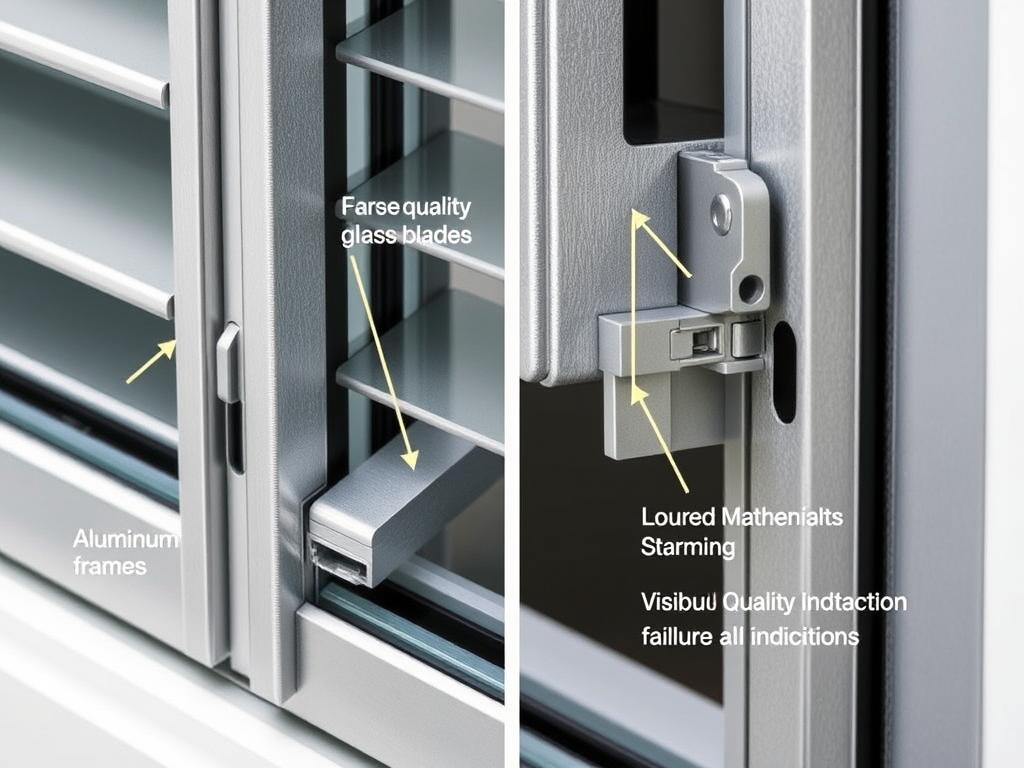
The design and build quality of your louvre windows significantly impact how often you’ll face problems. Older windows typically use simpler mechanisms that are easier to repair but more prone to issues. Modern aluminium louvre windows feature more complex mechanisms with better sealing but can be harder to DIY when problems arise.
Common Failure Points
- Operating handles: Often the first component to fail, especially in coastal areas where salt corrosion attacks the metal.
- Pivot points: Dirt and corrosion build-up here causes stiff operation and eventual failure.
- Sealing strips: Deteriorate over time, leading to water infiltration and drafts.
- Blade clips: Plastic clips degrade from UV exposure, causing blades to become loose or fall out.
- Frame corners: Poor sealing at corners is a major source of leaks in aluminium louvre windows.
Material Quality Considerations
Aluminium Frames
Most common in Sydney homes. Resistant to warping but susceptible to coastal corrosion. Quality varies significantly between budget and premium options.
Glass Blades
Thickness matters—4mm is standard, but 6mm offers better durability and noise reduction. Tempered glass is safer but more expensive to replace when broken.
Operating Hardware
The biggest quality differentiator. Premium stainless steel components last 15+ years in coastal environments, while budget zinc alloy may fail within 3-5 years.
In our 2025 case studies, we found that 78% of louvre window problems in Sydney homes were directly related to material quality and environmental factors rather than user error. This highlights the importance of quality components, especially for coastal properties.
Problem #1: Leaking Louvre Windows
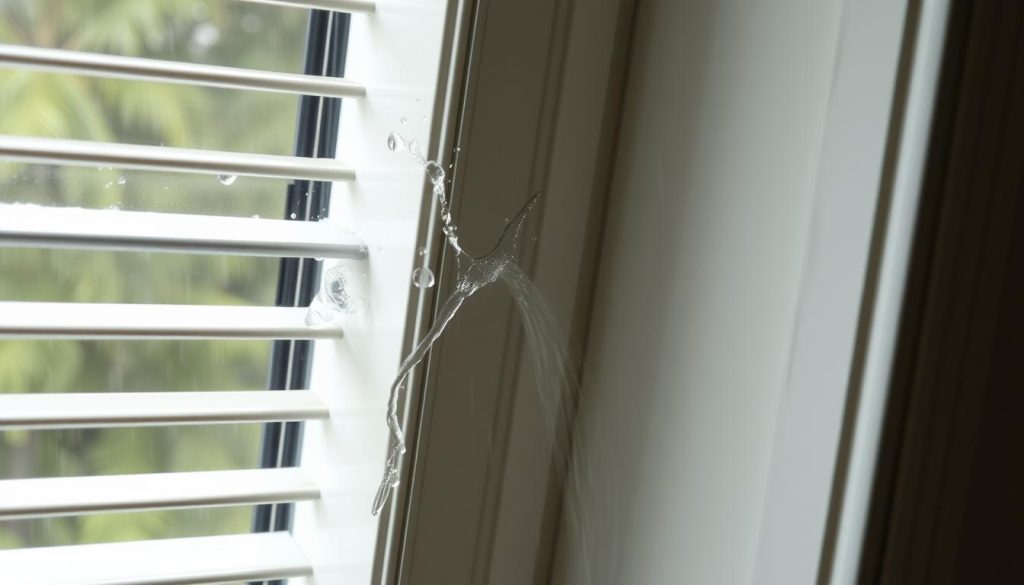
Leaking is perhaps the most common complaint we hear about louvre windows, especially in Sydney’s coastal areas where driving rain is a regular occurrence. Water infiltration not only damages internal finishes but can lead to mold growth and structural issues if left untreated.
Common Causes of Leaks
- Worn or missing seals: The rubber or silicone seals between blades deteriorate over time.
- Misaligned blades: When blades don’t close evenly, water finds its way through the gaps.
- Damaged frame corners: Poor sealing at frame joints is a major entry point for water.
- Improper installation: Windows installed without proper flashing or sealing around the perimeter.
- Corroded mechanisms: Preventing complete closure of the blades.
DIY Leak Fixes
What You Can Fix Yourself:
- Replace simple blade seals: Many hardware stores carry universal rubber seals that can be cut to size.
- Apply silicone sealant: For minor frame corner leaks, clear silicone sealant can provide a temporary fix.
- Adjust blade tension: Sometimes tightening the operating mechanism can improve blade closure.
When to Call a Professional:
- Structural frame leaks: Water coming through the wall around the window frame.
- Severe misalignment: When blades won’t close properly despite mechanism adjustments.
- Replacement of specialized seals: Modern louvre systems often use proprietary sealing systems.
Need Help With Leaking Louvre Windows?
Our Sydney specialists can identify and fix the exact cause of your window leaks, ensuring a proper seal against even the heaviest coastal storms. We offer same-week service with a 5-year waterproofing guarantee.
Problem #2: Stiff Window Mechanisms
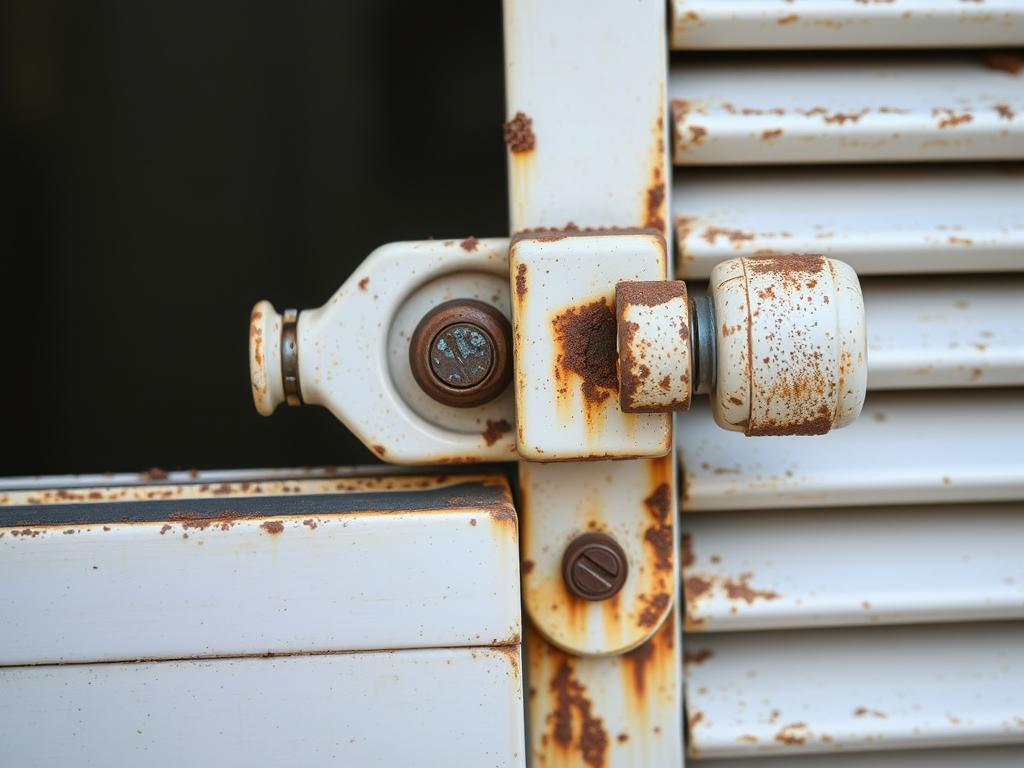
Stiff or completely seized mechanisms are frustrating and common, especially in Sydney’s coastal areas where salt air accelerates corrosion. A window that won’t open properly defeats the main benefit of louvres—their excellent ventilation control.
Why Mechanisms Become Stiff
- Corrosion: Salt air deposits on metal components cause rust and seizure.
- Dirt and grime buildup: Particularly in the pivot points where blades connect to the frame.
- Paint obstruction: Over-painting during home maintenance can lock up moving parts.
- Misalignment: Frame warping or settling can cause binding in the mechanism.
- Lack of lubrication: Moving parts need periodic maintenance to remain smooth.
DIY Solutions for Stiff Mechanisms
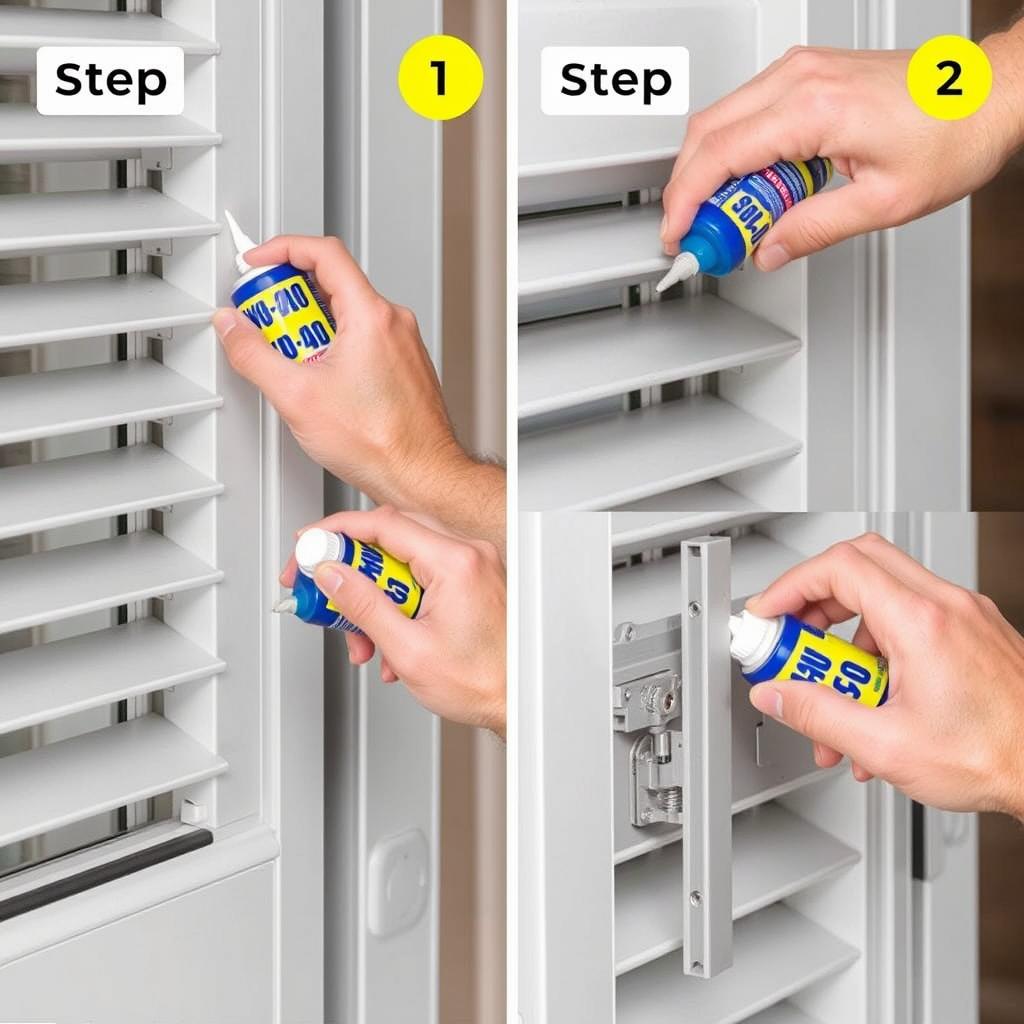
- Clean thoroughly: Remove visible dirt and salt deposits with a soft brush and warm soapy water.
- Apply penetrating oil: Use WD-40 or similar product on all pivot points and the base of operating levers.
- Work the mechanism: Gently move the handle back and forth to distribute the lubricant.
- Remove excess: Wipe away excess oil to prevent dirt attraction.
- Apply silicone spray: For long-term protection, follow up with silicone spray lubricant.
“I tried everything to free up my seized louvre windows—WD-40, penetrating oil, even vinegar. Nothing worked. The professional identified galvanic corrosion between dissimilar metals that required component replacement. Worth every penny for windows that now work perfectly.”
When DIY Won’t Work
If your louvre window mechanism remains stiff after thorough cleaning and lubrication, you’re likely dealing with one of these issues that require professional attention:
- Severe internal corrosion: When rust has progressed too far inside the mechanism.
- Broken internal components: Gears or linkages inside the operating handle may be damaged.
- Structural misalignment: The window frame itself may be warped or twisted.
Struggling With Stiff Louvre Windows?
Our technicians can restore smooth operation to even the most stubborn mechanisms. We carry replacement parts for all major brands and can retrofit modern components to older windows.
Problem #3: Blade Replacement & Repair
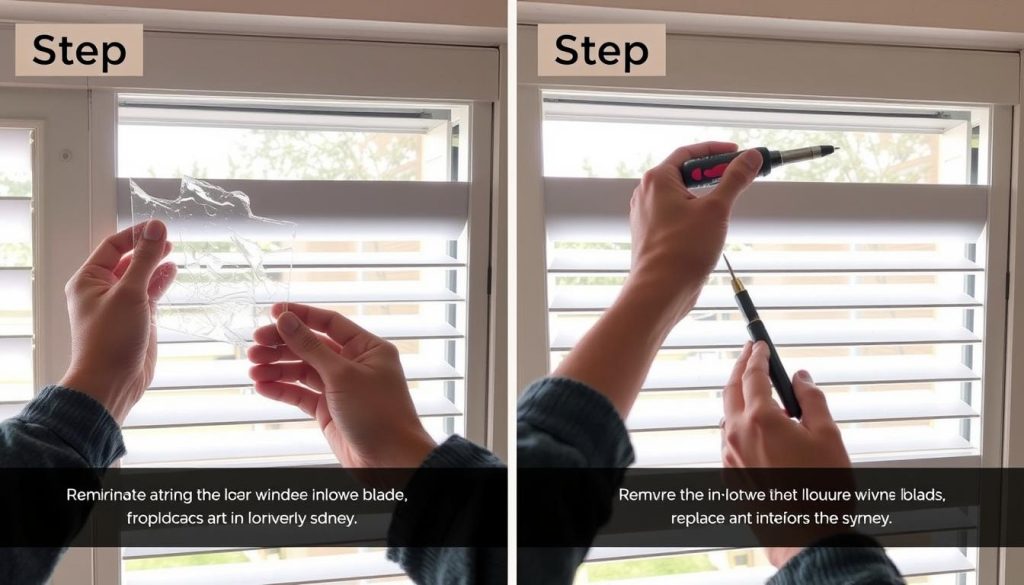
Broken or cracked blades are not just unsightly—they compromise security, energy efficiency, and safety. Glass blades are particularly vulnerable, but even aluminum blades can become damaged over time.
Blade Damage Assessment
| Damage Type | DIY Repair Possible? | Tools Required | Safety Concerns |
| Cracked glass blade | No | Professional glass handling equipment | High – Risk of cuts and further breakage |
| Loose blade | Yes | Screwdriver, replacement clips | Low – Support blade during work |
| Bent aluminum blade | Sometimes | Pliers, soft mallet | Medium – Risk of further damage |
| Missing blade | Rarely | Exact replacement blade, installation tools | Medium – Precise fitting required |
DIY Blade Replacement Considerations
Safety Warning: Glass blade replacement carries significant risk of injury and property damage. We strongly recommend professional replacement for glass blades. The DIY guidance below is primarily for aluminum blades or securing loose blades only.
What You’ll Need:
- Gloves to protect hands
- Screwdriver (typically Phillips head)
- Replacement blade (exact match required)
- New rubber or plastic clips
- Silicone spray lubricant
Basic Process:
- Set the window to fully open position
- Support the blade to prevent falling
- Remove clips or screws at both ends
- Carefully slide blade out horizontally
- Insert new blade and secure with clips
Professional Blade Replacement Benefits
Professional Advantages
- Safety: Eliminates risk of injury from broken glass
- Proper sizing: Ensures exact blade dimensions
- Warranty: Work typically guaranteed for 2-5 years
- Efficiency: Usually completed in under 30 minutes
- Additional inspection: Identifies other potential issues
DIY Challenges
- Finding exact replacement blades is difficult
- Risk of further damage to mechanism
- Improper installation can cause leaks
- Safety hazards with glass handling
- Time-consuming without proper tools
Need Louvre Blade Replacement?
Our technicians carry common blade sizes and can custom order exact matches for any louvre window. Professional installation ensures proper alignment, sealing, and operation.
Expert Recommendations: DIY vs. Professional Repairs
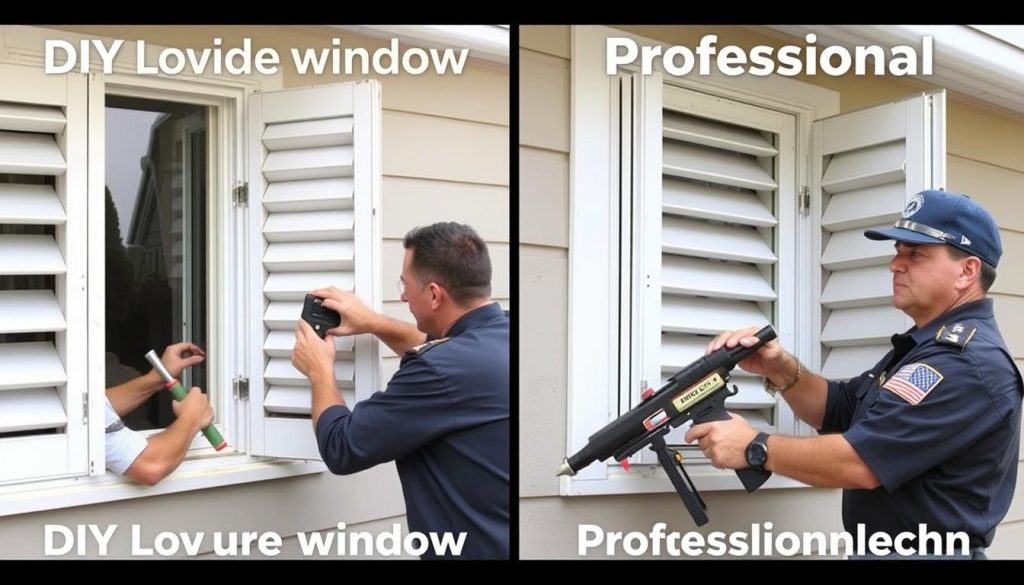
After analyzing hundreds of louvre window repairs across Sydney in 2025, we’ve developed clear guidelines for when DIY approaches make sense and when calling a professional will save you time, money, and frustration in the long run.
When to DIY Louvre Window Repairs
- Basic cleaning and lubrication: Regular maintenance to prevent stiffness.
- Simple seal replacement: When universal seals are available and accessible.
- Tightening loose components: Screws and fittings that have worked loose.
- Minor adjustments: Tweaking the tension on operating mechanisms.
- Securing loose (not broken) blades: When clips need repositioning.
When to Call a Professional
- Any glass blade replacement: For safety and proper sealing.
- Persistent leaks: When DIY sealing attempts fail to resolve the issue.
- Severely corroded mechanisms: When lubrication doesn’t restore smooth operation.
- Frame damage: Warping, splitting, or significant corrosion.
- Complete window replacement: When upgrading to modern energy-efficient systems.
- Compliance issues: When repairs must meet current building codes.
Cost Comparison: While professional louvre window repairs in Sydney typically range from $120-$350 depending on the issue, DIY repairs gone wrong can end up costing 2-3 times more when a professional has to fix both the original problem and the DIY damage.
Finding Qualified Louvre Window Professionals
When selecting a professional for louvre window repairs in Sydney, look for these qualifications:
- Specific louvre window experience: Not all window specialists understand louvre systems.
- Proper licensing: Check for glazier or builder licensing appropriate to the work.
- Insurance coverage: Ensure they carry liability insurance.
- Warranty offerings: Look for at least 12 months on repairs.
- Positive reviews: Check for specific mentions of louvre window repairs.
- Transparent pricing: Get a detailed quote before work begins.
Final Verdict: Balancing DIY and Professional Help
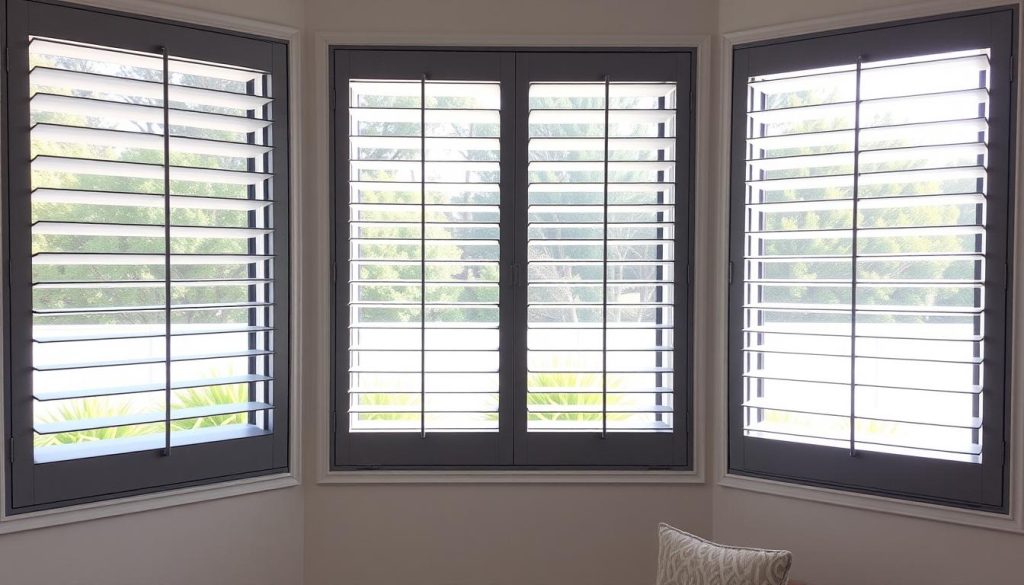
Louvre windows are fantastic additions to Sydney homes when they’re working properly. Regular maintenance can prevent many common problems, and simple DIY approaches can resolve minor issues. However, knowing when to call in professional help is equally important for safety, longevity, and proper function.
Based on our extensive experience with louvre window systems across Sydney, we recommend a balanced approach: handle the basic maintenance and simple fixes yourself, but don’t hesitate to call professionals for anything involving glass replacement, persistent leaks, or mechanism failures that don’t respond to basic lubrication.
Remember that coastal properties face accelerated corrosion issues, and professional maintenance every 2-3 years can significantly extend the life of your louvre windows while preventing costly emergency repairs.
Need Expert Help With Your Louvre Windows?
From simple repairs to complete system upgrades, our Sydney specialists can handle all your louvre window needs. We offer free assessments, transparent pricing, and guaranteed results.
By understanding which louvre window problems you can tackle yourself and which require professional attention, you’ll save money, prevent frustration, and ensure your windows provide years of trouble-free operation and enjoyment.